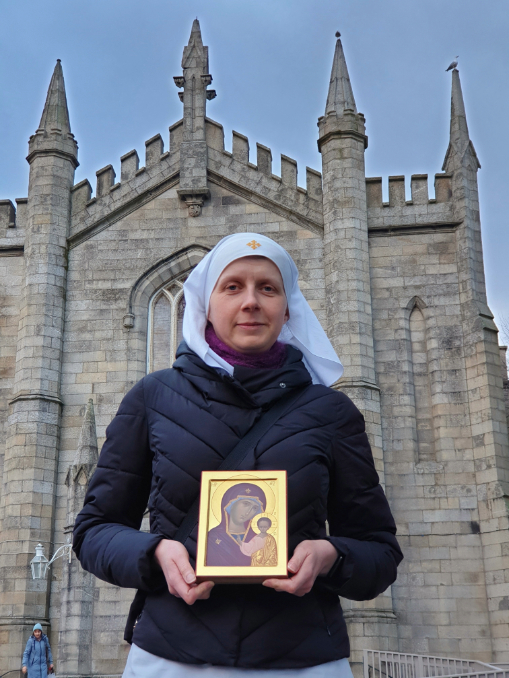
Sister Helen Volynets poses with an icon of Mary and the Christ Child outside Holy Apostles Peter and Paul Russian Orthodox Church in Harold's Cross in Dublin March 3, 2024. Sister Helen and another Russian Orthodox religious sister visited Ireland on a trip to raise money for projects undertaken by their convent of St. Elizabeth the Royal Martyr in Minsk. (OSV News/Sarah Mac Donald)
Sisters from the Russian Orthodox convent of St. Elizabeth the Royal Martyr in Minsk, Belarus, said they have received a warm welcome in Ireland despite their country's support for Russia's invasion of Ukraine and Ireland's strong support for Ukrainians.
Sister Helen Volynets and Sister Veronica Vasilyeva addressed congregations in the Jesuit parish in Dublin as well as parishes and schools in County Monaghan and County Louth. They told parishioners about their work with the mentally ill, the homeless, former prisoners and those with addictions in Minsk.
The sisters were in Ireland to fundraise for their projects through the sale of Russian icons, religious items as well as souvenirs made by project participants.
St. Elizabeth's is the only monastic cloister for women in the Belarus capital. Located in the outskirts of Minsk, it houses 145 cloistered nuns, while 300 lay sisters, or Sisters of Mercy, like Helen and Veronica, work there during the day but live in their own homes.
Lay sisters are "like members of Third Order of St. Francis or lay associates in the Catholic tradition," 36-year-old Helen told OSV News. She joined the community in 2008, when she was a university student studying languages in Minsk.
As a "white sister" -- she wears a white habit as opposed to the black habit of nuns -- she does not take vows but receives a blessing from the priest to be a lay sister.
Lay sisters are free to marry and "have the option to stay as lay sisters for as long as we want or to join the community and become nuns," Helen said.
"Being a lay sister is my way of being useful -- I feel connected. I can't imagine my life in any other place. It is work but we don’t call it work -- we call it obedience."
Of her time in Ireland, Helen said, "Irish people did everything they could to make us comfortable." The sisters stayed with the Medical Missionaries of Mary in Drogheda, who she said were very kind to them because "they used to do the same kind of work."
Advertisement
However, St. Elizabeth's was caught up in controversy in December 2022 when their Christmas Market stall was suspended by Winchester Cathedral in England over concerns about the pro-Russian views of some of the monastery’s leadership, notably Archpriest Andrey Lemeshonok.
Helen admitted that Winchester Cathedral's decision hit them financially. "It is a big loss, and we didn’t get to meet those people who came looking for us. We got upset but we went to the market in Galway," a city in the west of Ireland, as well as Belfast in Northern Ireland.
Asked if the convent assists refugees from the war in Ukraine, Helen responded, "We do help refugees and we do collect humanitarian aid and money in the convent. We have a person who comes for this money and he brings this to Ukraine as a help."
They are set to return to Ireland later this year as they have received a number of new invitations from parishes. "Some people are very interested in the icons because it is very hard to get good quality icons in Ireland."
Another link between the Orthodox Church in Belarus and Ireland is the common veneration of St. Patrick, whose feast day is celebrated March 17.
"People know St. Patrick in our country; he is a saint from before the division between Orthodox and Catholics," Helen said.
But in Great Britain and Northern Ireland, St. Elizabeth, whom the Minsk convent is named after, also is popular because "she belonged to the British royal family," Helena told OSV News.
A granddaughter of Queen Victoria, she became the Grand Duchess Elizabeth Fyodorovna of Russia upon marrying Grand Duke Sergei Alexandrovich, the fifth son of Emperor Alexander II.
When her husband was assassinated in 1905, she became a nun and founded a convent dedicated to ministering to the poor. She was later martyred by the Bolsheviks in 1918.







